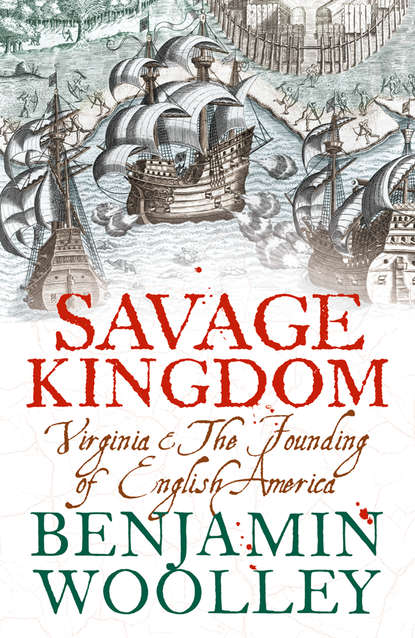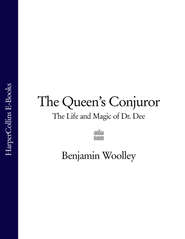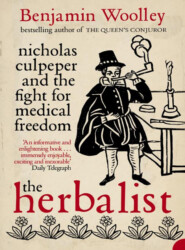По всем вопросам обращайтесь на: info@litportal.ru
(©) 2003-2024.
✖
Savage Kingdom: Virginia and The Founding of English America
Настройки чтения
Размер шрифта
Высота строк
Поля
Savage Kingdom: Virginia and The Founding of English America
Benjamin Woolley
Epic history of the first Virginia Colony and the true story of Pocahontas, to coincide with the colony’s 400th anniversary in 2007.Four centuries ago, and fourteen years before the Mayflower, a group of men-led by a one-armed ex-pirate, an epileptic aristocrat, a reprobate cleric and a government spy-left London aboard a fleet of three ships to start a new life in America. They arrived in Virginia in the spring of 1607, and set about trying to create a settlement on a tiny island in the James River. Despite their shortcomings and against the odds, they built Jamestown, a ramshackle outpost which laid the foundations of the British Empire and the United States of America.Drawing on new discoveries, neglected sources and manuscript collections scattered across the world, Savage Kingdom challenges the textbook image of Jamestown as a mere money-making venture. It reveals a reckless, daring enterprise led by outcasts of the old world who found themselves interlopers in a new one. It charts their journey into a beautiful landscape and sophisticated culture that they found both ravishing and alien, which they yearned to possess, but threatened to destroy.It shows them trying to escape the 'Savage Kingdom' that their homeland had become, and endeavoring to build 'one of the most glorious nations under the sun'.An intimate story in an epic setting, Woolley shows how the land of Pocahontas came to be drawn into a new global order, reaching from London to the Orinoco Delta, from the warring kingdoms of Angola to the slave markets of Mexico, from the gates of the Ottoman Empire to the foothills of the Blue Ridge Mountains.Note that it has not been possible to include the same picture content that appeared in the original print version.
SAVAGE KINGDOM
Virginia and the Founding
of English America
BENJAMIN WOOLLEY
CONTENTS
Cover (#udf14afa7-9929-54bc-9646-ed4f45558365)
Title Page (#u482d27a4-5126-5212-87f9-0f076012aab1)
Part One (#u712bf109-8064-5534-9549-377be11a2754)
1 A Feast of Flowers and Blood (#u848415b1-615b-50d5-9f7b-a6f0c084d272)
2 Machiavelli (#ub6cfd903-875e-5cd4-9c10-7775ad44c92d)
3 The Adventurers (#u43d67f30-ad8c-5e5c-bc50-562597aa4891)
4 Departure (#u4863c9cd-6ffc-5fd5-9da2-9a23f0c964df)
Part Two (#ub5a14d6a-8b68-5cd9-bb4f-dd04aeb0ab44)
5 Tsenacomoco (#ua5089791-d1d1-5d8e-a384-7a7403051285)
6 Soundings (#u62c98aba-5871-536b-8fa5-85623d0c7bb4)
7 The Spanish Ambassador (#u84c91a79-4d36-52ef-8d29-57ccb77efaaa)
8 Bloody Flux (#ue3a9202e-84c6-5aa5-b71e-79837ba8dc04)
9 True Relations (#u55babdb5-23a0-570a-a7cf-5ecf9cd0fbab)
10 The Virginian Sea (#litres_trial_promo)
Part Three (#litres_trial_promo)
11 El Dorado (#litres_trial_promo)
12 The Mermaid (#litres_trial_promo)
13 Promised Land (#litres_trial_promo)
14 The Astrologer (#litres_trial_promo)
15 Devil’s Island (#litres_trial_promo)
16 Deliverance (#litres_trial_promo)
Part Four (#litres_trial_promo)
17 A Pallid Anonymous Creature (#litres_trial_promo)
18 Strange Fish (#litres_trial_promo)
19 The Good Husband (#litres_trial_promo)
20 Twelfth Night (#litres_trial_promo)
Part Five (#litres_trial_promo)
21 Imbangala (#litres_trial_promo)
22 The Treasurer (#litres_trial_promo)
23 The ‘Viperous Brood’ (#litres_trial_promo)
24 The Unmasked Face (#litres_trial_promo)
Notes (#litres_trial_promo)
Bibliography (#litres_trial_promo)
Index (#litres_trial_promo)
About the Author (#litres_trial_promo)
Author’s Note (#litres_trial_promo)
Copyright (#litres_trial_promo)
About the Publisher (#litres_trial_promo)
Part One (#ulink_409a00ed-ec9e-59ff-8bf3-b02de4fdc276)
ONE A Feast of Flowers and Blood (#ulink_fb27c0b4-214c-5141-93eb-29980aecbe3d)
ON THE MORNING of 20 September 1565, the sixty-year-old carpenter Nicolas le Challeux awoke to the sound of rain pelting down on the palm-leaf thatch overhead. It had not stopped for days, and a muddy morass awaited him outside.
When he had arrived in Florida the previous month, a sunnier prospect had beckoned. He had left the terrors of his native France far behind, and come to a place where he could practise his craft and religion in peace. Its very name suggested renewal, the Spanish explorer Juan Ponce de León calling it Florida after the season in which he first sighted its shores: Easter Week, or Pascua Florida, ‘the feast of flowers’.
Florida could furnish all that a man could wish on earth, Challeux had been told. It had received a particular favour from heaven, suffering neither the snow nor raw frost of the North, nor the drying, burning heat of the South. The soil was so fertile, the forest so full of wild animals, the honest and gentle natives could live off the land without having to cultivate it. There were even reports of unicorns, and of veins of gold in a great mountain range to the north called the ‘Appalatcy’. It was ‘impossible that a man could not find there great pleasure and delight,’ Challeux was assured.
Benjamin Woolley
Epic history of the first Virginia Colony and the true story of Pocahontas, to coincide with the colony’s 400th anniversary in 2007.Four centuries ago, and fourteen years before the Mayflower, a group of men-led by a one-armed ex-pirate, an epileptic aristocrat, a reprobate cleric and a government spy-left London aboard a fleet of three ships to start a new life in America. They arrived in Virginia in the spring of 1607, and set about trying to create a settlement on a tiny island in the James River. Despite their shortcomings and against the odds, they built Jamestown, a ramshackle outpost which laid the foundations of the British Empire and the United States of America.Drawing on new discoveries, neglected sources and manuscript collections scattered across the world, Savage Kingdom challenges the textbook image of Jamestown as a mere money-making venture. It reveals a reckless, daring enterprise led by outcasts of the old world who found themselves interlopers in a new one. It charts their journey into a beautiful landscape and sophisticated culture that they found both ravishing and alien, which they yearned to possess, but threatened to destroy.It shows them trying to escape the 'Savage Kingdom' that their homeland had become, and endeavoring to build 'one of the most glorious nations under the sun'.An intimate story in an epic setting, Woolley shows how the land of Pocahontas came to be drawn into a new global order, reaching from London to the Orinoco Delta, from the warring kingdoms of Angola to the slave markets of Mexico, from the gates of the Ottoman Empire to the foothills of the Blue Ridge Mountains.Note that it has not been possible to include the same picture content that appeared in the original print version.
SAVAGE KINGDOM
Virginia and the Founding
of English America
BENJAMIN WOOLLEY
CONTENTS
Cover (#udf14afa7-9929-54bc-9646-ed4f45558365)
Title Page (#u482d27a4-5126-5212-87f9-0f076012aab1)
Part One (#u712bf109-8064-5534-9549-377be11a2754)
1 A Feast of Flowers and Blood (#u848415b1-615b-50d5-9f7b-a6f0c084d272)
2 Machiavelli (#ub6cfd903-875e-5cd4-9c10-7775ad44c92d)
3 The Adventurers (#u43d67f30-ad8c-5e5c-bc50-562597aa4891)
4 Departure (#u4863c9cd-6ffc-5fd5-9da2-9a23f0c964df)
Part Two (#ub5a14d6a-8b68-5cd9-bb4f-dd04aeb0ab44)
5 Tsenacomoco (#ua5089791-d1d1-5d8e-a384-7a7403051285)
6 Soundings (#u62c98aba-5871-536b-8fa5-85623d0c7bb4)
7 The Spanish Ambassador (#u84c91a79-4d36-52ef-8d29-57ccb77efaaa)
8 Bloody Flux (#ue3a9202e-84c6-5aa5-b71e-79837ba8dc04)
9 True Relations (#u55babdb5-23a0-570a-a7cf-5ecf9cd0fbab)
10 The Virginian Sea (#litres_trial_promo)
Part Three (#litres_trial_promo)
11 El Dorado (#litres_trial_promo)
12 The Mermaid (#litres_trial_promo)
13 Promised Land (#litres_trial_promo)
14 The Astrologer (#litres_trial_promo)
15 Devil’s Island (#litres_trial_promo)
16 Deliverance (#litres_trial_promo)
Part Four (#litres_trial_promo)
17 A Pallid Anonymous Creature (#litres_trial_promo)
18 Strange Fish (#litres_trial_promo)
19 The Good Husband (#litres_trial_promo)
20 Twelfth Night (#litres_trial_promo)
Part Five (#litres_trial_promo)
21 Imbangala (#litres_trial_promo)
22 The Treasurer (#litres_trial_promo)
23 The ‘Viperous Brood’ (#litres_trial_promo)
24 The Unmasked Face (#litres_trial_promo)
Notes (#litres_trial_promo)
Bibliography (#litres_trial_promo)
Index (#litres_trial_promo)
About the Author (#litres_trial_promo)
Author’s Note (#litres_trial_promo)
Copyright (#litres_trial_promo)
About the Publisher (#litres_trial_promo)
Part One (#ulink_409a00ed-ec9e-59ff-8bf3-b02de4fdc276)
ONE A Feast of Flowers and Blood (#ulink_fb27c0b4-214c-5141-93eb-29980aecbe3d)
ON THE MORNING of 20 September 1565, the sixty-year-old carpenter Nicolas le Challeux awoke to the sound of rain pelting down on the palm-leaf thatch overhead. It had not stopped for days, and a muddy morass awaited him outside.
When he had arrived in Florida the previous month, a sunnier prospect had beckoned. He had left the terrors of his native France far behind, and come to a place where he could practise his craft and religion in peace. Its very name suggested renewal, the Spanish explorer Juan Ponce de León calling it Florida after the season in which he first sighted its shores: Easter Week, or Pascua Florida, ‘the feast of flowers’.
Florida could furnish all that a man could wish on earth, Challeux had been told. It had received a particular favour from heaven, suffering neither the snow nor raw frost of the North, nor the drying, burning heat of the South. The soil was so fertile, the forest so full of wild animals, the honest and gentle natives could live off the land without having to cultivate it. There were even reports of unicorns, and of veins of gold in a great mountain range to the north called the ‘Appalatcy’. It was ‘impossible that a man could not find there great pleasure and delight,’ Challeux was assured.







